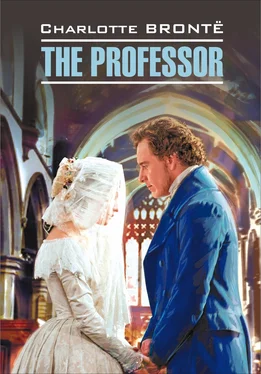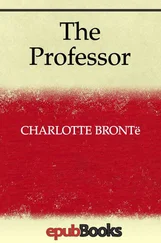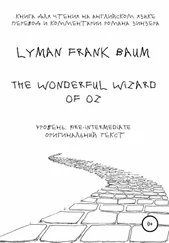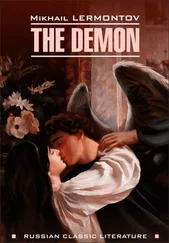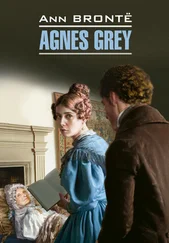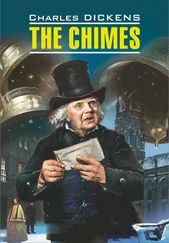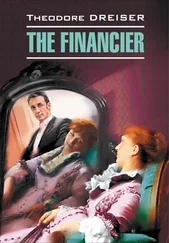Шарлотта Бронте - The Professor / Учитель. Книга для чтения на английском языке
Здесь есть возможность читать онлайн «Шарлотта Бронте - The Professor / Учитель. Книга для чтения на английском языке» — ознакомительный отрывок электронной книги совершенно бесплатно, а после прочтения отрывка купить полную версию. В некоторых случаях можно слушать аудио, скачать через торрент в формате fb2 и присутствует краткое содержание. ISBN: , Жанр: foreign_language, literature_19, foreign_prose, на английском языке. Описание произведения, (предисловие) а так же отзывы посетителей доступны на портале библиотеки ЛибКат.
- Название:The Professor / Учитель. Книга для чтения на английском языке
- Автор:
- Жанр:
- Год:неизвестен
- ISBN:978-5-9925-0777-5
- Рейтинг книги:5 / 5. Голосов: 1
-
Избранное:Добавить в избранное
- Отзывы:
-
Ваша оценка:
- 100
- 1
- 2
- 3
- 4
- 5
The Professor / Учитель. Книга для чтения на английском языке: краткое содержание, описание и аннотация
Предлагаем к чтению аннотацию, описание, краткое содержание или предисловие (зависит от того, что написал сам автор книги «The Professor / Учитель. Книга для чтения на английском языке»). Если вы не нашли необходимую информацию о книге — напишите в комментариях, мы постараемся отыскать её.
В книгу вошел полный неадаптированный текст романа с комментариями и словарем.
The Professor / Учитель. Книга для чтения на английском языке — читать онлайн ознакомительный отрывок
Ниже представлен текст книги, разбитый по страницам. Система сохранения места последней прочитанной страницы, позволяет с удобством читать онлайн бесплатно книгу «The Professor / Учитель. Книга для чтения на английском языке», без необходимости каждый раз заново искать на чём Вы остановились. Поставьте закладку, и сможете в любой момент перейти на страницу, на которой закончили чтение.
Интервал:
Закладка:
It was a fine day, but I would not look at the blue sky or at the stately houses round me; my mind was bent on one thing, finding out “Mr. Brown, Numero —, Rue Royale,” for so my letter was addressed. By dint of inquiry I succeeded; I stood at last at the desired door, knocked, asked for Mr. Brown, and was admitted.
Being shown into a small breakfast-room, I found myself in the presence of an elderly gentleman – very grave, business-like, and respectable-looking. I presented Mr. Hunsden’s letter; he received me very civilly. After a little desultory conversation he asked me if there was anything in which his advice or experience could be of use. I said, “Yes,” and then proceeded to tell him that I was not a gentleman of fortune, travelling for pleasure, but an ex-counting-house clerk, who wanted employment of some kind, and that immediately too [99] and that immediately too – ( разг. ) и к тому же немедленно
. He replied that as a friend of Mr. Hunsden’s he would be willing to assist me as well as he could. After some meditation he named a place in a mercantile house at Liege, and another in a bookseller’s shop at Louvain.
“Clerk and shopman!” murmured I to myself. “No.” I shook my head. I had tried the high stool [100] had tried the high stool – ( зд. ) уже насиделся на высоком конторском табурете
; I hated it; I believed there were other occupations that would suit me better; besides I did not wish to leave Brussels.
“I know of no place in Brussels,” answered Mr. Brown, “unless indeed you were disposed to turn your attention to teaching. I am acquainted with the director of a large establishment who is in want of a professor of English and Latin.”
I thought two minutes, then I seized the idea eagerly. “The very thing [101] The very thing – ( разг. ) То, что надо
, sir!” said I.
“But,” asked he, “do you understand French well enough to teach Belgian boys English?”
Fortunately I could answer this question in the affirmative; having studied French under a Frenchman, I could speak the language intelligibly though not fluently. I could also read it well, and write it decently.
“Then,” pursued Mr. Brown, “I think I can promise you the place, for Monsieur Pelet will not refuse a professor recommended by me; but come here again at five o’clock this afternoon, and I will introduce you to him.”
The word “professor” struck me. “I am not a professor,” said I.
“Oh,” returned Mr. Brown, “professor, here in Belgium, means a teacher, that is all.”
My conscience thus quieted, I thanked Mr. Brown, and, for the present, withdrew. This time I stepped out into the street with a relieved heart; the task I had imposed on myself for that day was executed. I might now take some hours of holiday. I felt free to look up. For the first time I remarked the sparkling clearness of the air, the deep blue of the sky, the gay clean aspect of the white-washed or painted houses; I saw what a fine street was the Rue Royale, and, walking leisurely along its broad pavement, I continued to survey its stately hotels, till the palisades, the gates, and trees of the park appearing in sight, offered to my eye a new attraction. I remember, before entering the park, I stood awhile to contemplate the statue of General Belliard, and then I advanced to the top of the great staircase just beyond, and I looked down into a narrow back street, which I afterwards learnt was called the Rue d’Isabelle. I well recollect that my eye rested on the green door of a rather large house opposite, where, on a brass plate, was inscribed, “ Pensionnat de Demoiselles [102] Pensionnat de Demoiselles – ( фр. ) Пансион для девиц
.” Pensionnat ! The word excited an uneasy sensation in my mind; it seemed to speak of restraint. Some of the demoiselles , externats [103] demoiselles, externats – ( фр. ) приходящие ученицы
no doubt, were at that moment issuing from the door – I looked for a pretty face amongst them, but their close, little French bonnets hid their features; in a moment they were gone.
I had traversed a good deal of Brussels before five o’clock arrived, but punctually as that hour struck I was again in the Rue Royale. Re-admitted to Mr. Brown’s breakfast-room, I found him, as before, seated at the table, and he was not alone – a gentleman stood by the hearth. Two words of introduction designated him as my future master. “M. Pelet, Mr. Crimsworth; Mr. Crimsworth, M. Pelet”, a bow on each side finished the ceremony. I don’t know what sort of a bow I made; an ordinary one, I suppose, for I was in a tranquil, commonplace frame of mind; I felt none of the agitation which had troubled my first interview with Edward Crimsworth. M. Pelet’s bow was extremely polite, yet not theatrical, scarcely French; he and I were presently seated opposite to each other. In a pleasing voice, low, and, out of consideration to my foreign ears, very distinct and deliberate, M. Pelet intimated that he had just been receiving from “ le respectable M. Brown [104] le respectable M. Brown – ( фр. ) уважаемый мистер Браун
,” an account of my attainments and character, which relieved him from all scruple as to the propriety of engaging me as professor of English and Latin in his establishment; nevertheless, for form’s sake [105] for form’s sake – ( разг. ) для проформы
, he would put a few questions to test my powers. He did, and expressed in flattering terms his satisfaction at my answers. The subject of salary next came on; it was fixed at one thousand francs per annum [106] per annum – ( лат. ) в год
, besides board and lodging. “And in addition,” suggested M. Pelet, “as there will be some hours in each day during which your services will not be required in my establishment, you may, in time, obtain employment in other seminaries, and thus turn your vacant moments to profitable account.”
I thought this very kind, and indeed I found afterwards that the terms on which M. Pelet had engaged me were really liberal for Brussels; instruction being extremely cheap there on account of the number of teachers. It was further arranged that I should be installed in my new post the very next day, after which M. Pelet and I parted.
Well, and what was he like? and what were my impressions concerning him? He was a man of about forty years of age, of middle size, and rather emaciated figure; his face was pale, his cheeks were sunk, and his eyes hollow; his features were pleasing and regular, they had a French turn (for M. Pelet was no Fleming, but a Frenchman both by birth and parentage), yet the degree of harshness inseparable from Gallic lineaments was, in his case, softened by a mild blue eye, and a melancholy, almost suffering, expression of countenance; his physiognomy was “ fine et spirituelle [107] fine et spirituelle – ( фр. ) тонкая и умная
.” I use two French words because they define better than any English terms the species of intelligence with which his features were imbued. He was altogether an interesting and prepossessing personage. I wondered only at the utter absence of all the ordinary characteristics of his profession, and almost feared he could not be stern and resolute enough for a schoolmaster. Externally at least M. Pelet presented an absolute contrast to my late master, Edward Crimsworth.
Influenced by the impression I had received of his gentleness, I was a good deal surprised when, on arriving the next day at my new employer’s house, and being admitted to a first view of what was to be the sphere of my future labours, namely the large, loft y, and well-lighted schoolrooms, I beheld a numerous assemblage of pupils, boys of course, whose collective appearance showed all the signs of a full, flourishing, and well-disciplined seminary. As I traversed the classes in company with M. Pelet, a profound silence reigned on all sides, and if by chance a murmur or a whisper arose, one glance from the pensive eye of this most gentle pedagogue stilled it instantly. It was astonishing, I thought, how so mild a check could prove so effectual. When I had perambulated the length and breadth of the classes, M. Pelet turned and said to me:
Читать дальшеИнтервал:
Закладка:
Похожие книги на «The Professor / Учитель. Книга для чтения на английском языке»
Представляем Вашему вниманию похожие книги на «The Professor / Учитель. Книга для чтения на английском языке» списком для выбора. Мы отобрали схожую по названию и смыслу литературу в надежде предоставить читателям больше вариантов отыскать новые, интересные, ещё непрочитанные произведения.
Обсуждение, отзывы о книге «The Professor / Учитель. Книга для чтения на английском языке» и просто собственные мнения читателей. Оставьте ваши комментарии, напишите, что Вы думаете о произведении, его смысле или главных героях. Укажите что конкретно понравилось, а что нет, и почему Вы так считаете.
